Marine Life & Conservation
Microplastics on the menu of Manta Rays and Whale Sharks
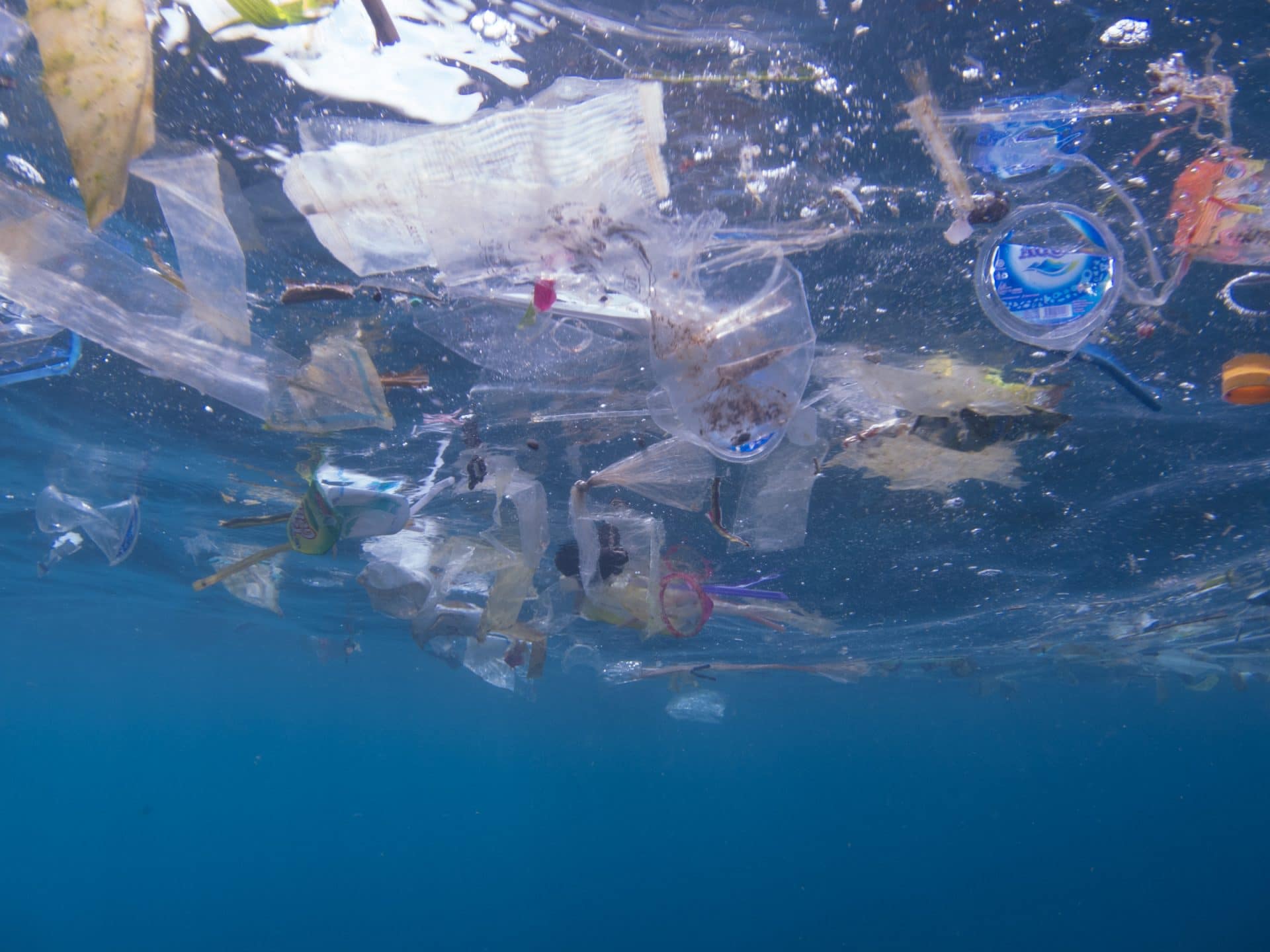
Plastics pollute Indonesian feeding grounds of plankton-feeding ocean giants…
Plastic pollution has a tremendous impact on marine life – and reef manta rays and whale sharks are not spared from it. These large filter-feeders swallow hundreds to thousands of cubic meters of plankton-filled water every day, and with it, tiny plastic pieces from broken down carrier bags and single-use packaging, a new study has found.
Marine biologists from the Marine Megafauna Foundation, Murdoch University (Australia) and Udayana University (Indonesia), estimated the amount of plastic particles present in the waters off Nusa Penida (Bali), Komodo National Park and East Java in Indonesia and, based on that, calculated how many pieces reef manta rays and whale sharks might be ingesting. These shark species sieve nutrient-rich water through their gills as they swim.
As manta rays and whale sharks spend a lot of time feeding in inshore surface waters where trash commonly aggregates, the researchers used a plankton net to trawl for plastics in the top 50 cm of the water column. They also counted any debris visible at the surface from the boat.
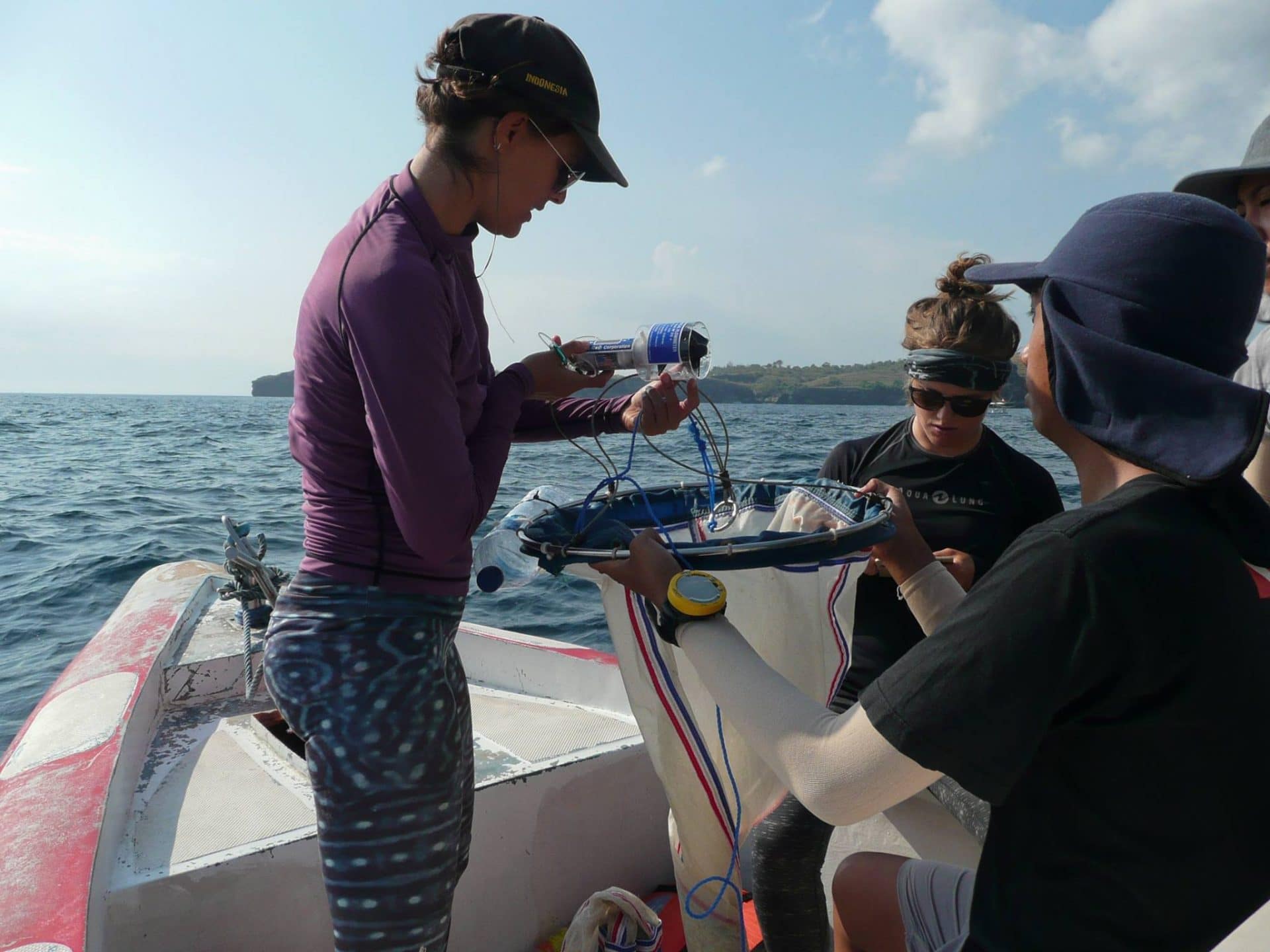
Elitza Germanov on boat – Marine Megafauna Foundation
Lead author Elitza Germanov, a researcher at the Marine Megafauna Foundation and PhD candidate at Murdoch University, said: “With time, plastics break down into smaller pieces called microplastics that large marine filter feeders might accidentally scoop up because they float among their prey.”
“Manta rays and whale sharks can ingest microplastics directly from polluted water or indirectly through the contaminated plankton they feed on,” she adds.
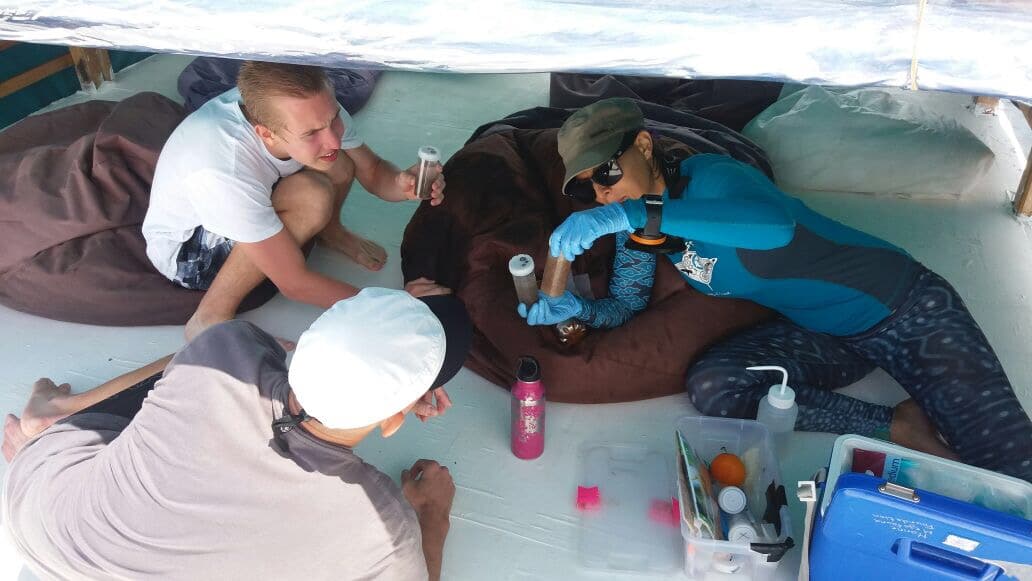
Plankton microplastics sampling – Marine Megafauna Foundation
The collaborative study, which is published today in the journal Frontiers in Marine Science, found that reef manta rays may ingest up to 63 pieces of plastic per hour of feeding in Nusa Penida and Komodo National Park. Whale sharks, which seasonally aggregate in Java, could be ingesting up to 137 pieces per hour.
Thin and bendable films from single-use bags and wrappers as well as hard fragments were the most prevalent plastics (over 50% combined). Of all plastic recorded, around 80% were small pieces of less than 5mm, so-called microplastics.
Manta ray poo and vomit also tested positive for plastics, which means that plastics are easily ingested when filter feeding and likely expose the animals to toxic chemicals and pollutants found in plastics while in their digestive system. These toxic substances can accumulate over decades and alter the hormones that regulate an animal’s metabolism, growth and development, and reproductive functions. Larger plastic particles can block nutrient absorption and cause damage to the digestive tract of animals.
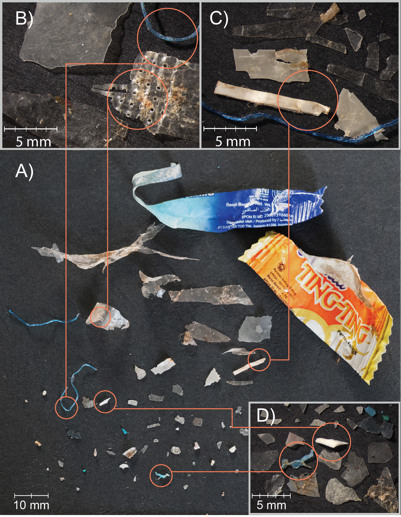
Microplastics in manta poo (c) Elitza Germanov et al 2019
Neil Loneragan, Professor of Marine Ecology and Conservation at Murdoch University said: “It is difficult to assess how much plastic manta rays and whale sharks actually ingest because conventional methods used to study animal diets, such as stomach analysis, are unsuitable for threatened species like these.”
Manta rays and whale sharks are globally threatened species facing extreme pressures from overfishing. They are often caught incidentally in nets or become entangled in fishing lines.

Manta with plastic in Indonesia – Elitza Germanov, Marine Megafauna Foundation
Indonesia is currently ranked as the second worst plastic polluter in the world and many neighbouring countries within the Coral Triangle are among the top 10. This study found that plastic abundance was up to 44 times higher during the rainy season, with the largest seasonal effect observed in Nusa Penida.
Dr. I. Gede Hedrawan, an Indonesian plastics researcher from Bali’s Udayana University and an author on this study, said: “The seasonal variability in plastic pollution shows what a difference it would make to clean up river beds before the rainy season begins.” Local authorities could also prohibit any waste disposal in areas around water sources.
“We welcome Bali’s recent ban on single-use plastic bags, straws and take away containers, although the law is yet to reach its full effect and spread to smaller businesses,” he says.
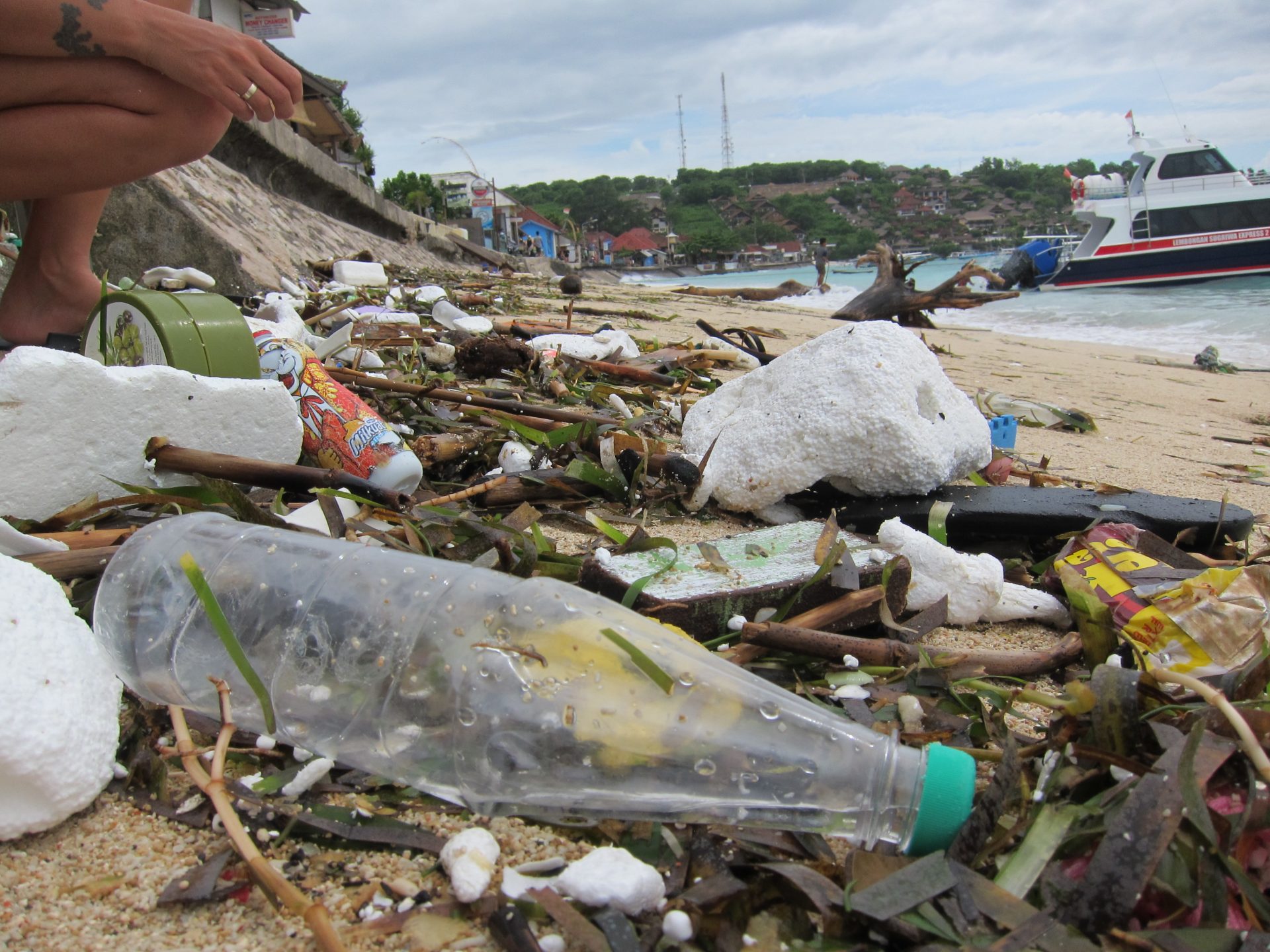
Trash on beach Indonesia – Elitza Germanov, Marine Megafauna Foundation
It is vital to understand the effects of microplastic pollution on ocean giants since nearly half of the mobulid rays, two thirds of filter-feeding sharks and over one quarter of baleen whales are listed by the IUCN as globally threatened species and are prioritized for conservation. Previous studies found that baleen whales may swallow microplastic particles in the thousands every day.
“We now know that, through exposure to toxic substances, plastic contamination has the potential to further reduce the population numbers of these threatened animals because they reproduce slowly and have few offspring throughout their lives,” Germanov concluded.
As plastic production is projected to increase globally, future research should focus on coastal regions where pollution overlaps with the critical feeding and breeding grounds of these ocean giants. Many areas such as the Nusa Penida Marine Protected Area and Komodo National Park are biodiversity hotspots with significant marine tourism.
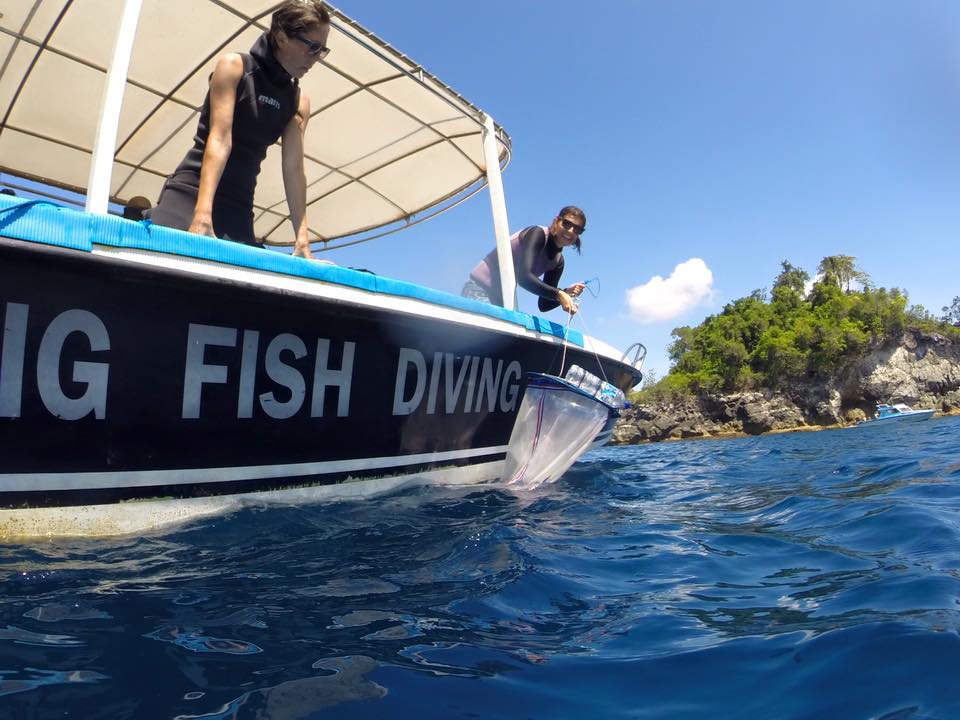
Trawling microplastic – Marine Megafauna Foundation
The field research was supported by the Ocean Park Conservation Foundation, PADI Foundation, Foundation FortUna, Mantahari Oceancare, Arenui Boutique Liveaboard, Current Junkies Liveaboard, Happy Days yacht, Scuba Junkie Komodo, and Wunderpus Liveaboard, and was carried out under a RisTek-Dikti (Indonesian Ministry of Research) permit.
The study by Elitza Germanov et al., titled ‘Microplastics on the menu: Plastics pollute Indonesian manta ray and whale shark feeding grounds’ is published in the journal Frontiers in Marine Science on 19 November 2019 and is available here: https://www.frontiersin.org/articles/10.3389/fmars.2019.00679/full
For further details, please see www.marinemegafauna.org or follow them on Twitter, Facebook and Instagram. For information about regional projects, follow the Marine Megafauna Foundation’s Southeast Asia Facebook page.
Marine Life & Conservation
Double Bubble for Basking Sharks

 The Shark Trust is excited to announce that, for two more days only, all donations, large or small, will be doubled in the Big Give Green Match Fund!
The Shark Trust is excited to announce that, for two more days only, all donations, large or small, will be doubled in the Big Give Green Match Fund!
Donate to Basking in Nature: Sighting Giants
The Shark Trust is hoping to raise £10k which will be doubled to £20k. This will go towards Basking in Nature: Sighting Giants. And they need YOUR help to reach they’re goal.
The Shark Trust’s citizen science project is to monitor and assess basking sharks through sightings; encouraging data collection, community engagement, and promoting nature accessibility. This initiative aims to enhance health and wellbeing by fostering a deeper connection with British Sharks.
Campaign Aims
- Increase citizen science reporting of Basking Sharks and other shark sightings to help inform shark and ray conservation.
- Provide educational talks about the diverse range of sharks and rays in British waters and accessible identification guides!
- Create engaging and fun information panels on how to ID the amazing sharks and rays we have on our doorstep! These can be used on coastal paths around the Southwest. With activities and information on how you can make a difference for sharks and rays!
- Promote mental wellbeing through increasing time in nature and discovering the wonders beneath the waves!
Donate, and double your impact. Click Here
Marine Life & Conservation
Leading UK-based shark conservation charity, the Shark Trust, is delighted to announce tour operator Diverse Travel as a Corporate Patron

 Corporate Patrons provide a valuable boost to the work of The Shark Trust. The Trust team works globally to safeguard the future of sharks, and their close cousins, the skates and rays, engaging with a global network of scientists, policymakers, conservation professionals, businesses and supporters to further shark conservation.
Corporate Patrons provide a valuable boost to the work of The Shark Trust. The Trust team works globally to safeguard the future of sharks, and their close cousins, the skates and rays, engaging with a global network of scientists, policymakers, conservation professionals, businesses and supporters to further shark conservation.
Specialist tour operator Diverse Travel has operated since 2014 and is committed to offering its guests high quality, sustainable scuba diving holidays worldwide. Working together with the Shark Trust will enable both organisations to widen engagement and encourage divers and snorkellers to actively get involved in shark conservation.
“Sharks are truly at the heart of every diver and at Diverse Travel, we absolutely share that passion. There is nothing like seeing a shark in the wild – it’s a moment that stays with you forever!” says Holly Bredin, Sales & Marketing Manager, Diverse Travel.
“We’re delighted to celebrate our 10th year of business by becoming a Corporate Patron of the Shark Trust. This is an exciting partnership for Diverse and our guests. We will be donating on behalf of every person who books a holiday with us to contribute towards their vital shark conservation initiatives around the world. We will also be working together with the Trust to inspire divers, snorkellers and other travellers to take an active role – at home and abroad – in citizen science projects and other activities.”
Paul Cox, CEO of The Shark Trust, said:
“It’s an exciting partnership and we’re thrilled to be working with Diverse Travel to enable more divers and travellers to get involved with sharks and shark conservation. Sharks face considerable conservation challenges but, through collaboration and collective action, we can secure a brighter future for sharks and their ocean home. This new partnership takes us one more valuable step towards that goal.”
For more information about the Shark Trust visit their website here.
For more about Diverse Travel click here.
-

 News3 months ago
News3 months agoHone your underwater photography skills with Alphamarine Photography at Red Sea Diving Safari in March
-

 News3 months ago
News3 months agoCapturing Critters in Lembeh Underwater Photography Workshop 2024: Event Roundup
-

 Marine Life & Conservation Blogs3 months ago
Marine Life & Conservation Blogs3 months agoCreature Feature: Swell Sharks
-

 Blogs2 months ago
Blogs2 months agoMurex Resorts: Passport to Paradise!
-

 Blogs2 months ago
Blogs2 months agoDiver Discovering Whale Skeletons Beneath Ice Judged World’s Best Underwater Photograph
-

 Gear Reviews2 weeks ago
Gear Reviews2 weeks agoGEAR REVIEW – Revolutionising Diving Comfort: The Sharkskin T2 Chillproof Suit
-

 Marine Life & Conservation2 months ago
Marine Life & Conservation2 months agoSave the Manatee Club launches brand new webcams at Silver Springs State Park, Florida
-

 Gear Reviews3 months ago
Gear Reviews3 months agoGear Review: Oceanic+ Dive Housing for iPhone






